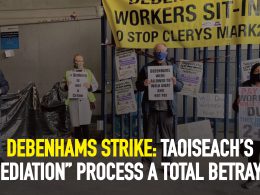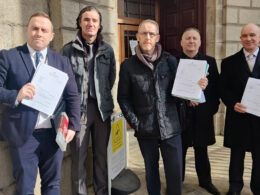By Kevin McLoughlin
ICTU’s PLAN was to threaten a national strike on 30 March in the hope of forcing new negotiations around their 10 point so-called social solidarity programme There is a better, fairer way.
ICTU’s social solidarity programme relates to jobs, unemployment, pay and the banks. It says those who lose their jobs should be kept at 80% of their earnings for two years, via social welfare, on condition that they go on retraining. It also says bosses should resist lay-offs, and instead consider cutting the working week.

That is not a serious policy on jobs. The unions are doing nothing while hundreds of thousands are being thrown on the dole. Yet they are proposing to negotiate with the government the doubling and trebling of social welfare payments at a time when the most likely prospect is cuts in benefits in the next year. Even if implemented what happens after two years when the private sector will still be incapable of providing jobs?
On pay they say IBEC had no justification to pull back from the latest pay deal, “No credible reason has been advanced to explain why the ‘inability to pay’ clause has not been utilised.” That presumably means that if the bosses had given the unions the courtesy of using this clause, wage cuts have been acceptable!
On the public sector pensions levy, the document says it’s “a crude and unfair instrument”, yet ICTU isn’t calling for it to be scrapped but for it to be recalibrated so higher earners in the public service would take most of the hit. However, it is clear given the savings that the government want on the levy that even if it was recalibrated, all public sector workers would still face draconian pay cuts in 2009 with more to come in the next few years.
On the banks, notwithstanding ICTU’s token call for nationalisation their approach is an acceptance of the government’s recapitalisation programme but with some limited “public control” to pressurise the banks into lending money to businesses to create jobs.
Recapitalisation will fail. You can’t control what you don’t own and even getting the banks to lend out the taxpayers money necessitates that they are nationalised under the control and management of working people. That is the only way the banks could work in the public interest.
David Begg welcomed that the new budget would involve tax increases saying that a policy of only cuts in public expenditure was a one-sided approach. While the government might increase some taxes on the wealthy, the burden of any new taxation will be placed firmly on ordinary workers.
Does ICTU really believe they can get any “fairness” from this government? The Socialist Party believes that ICTU should name the 30 March as a general strike against the government’s agenda and the new budget and in defence of the jobs and pay of all workers.
The government and IBEC’s policy of wage and jobs cuts will cause mass unemployment like never before and will turn Ireland into an economic wasteland and will actually make the budget deficit much worse. No credence should be given to these policies or the illusion that the private sector will play any role in resolving the crisis its profiteering created.








